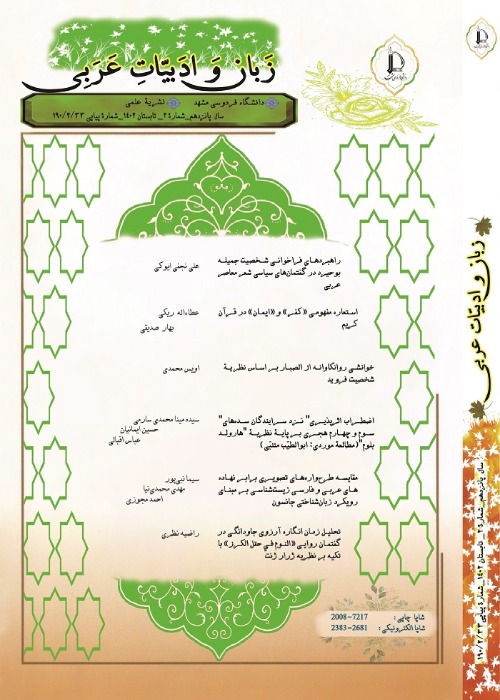Rhetoric of " Repetition" Device in the Themes of Javaheri's Satire and the Analysis of its Secondary Meaning
Author(s):
Abstract:
Introduction
Literature and society have an ancient, indissoluble bond. In social poetry, which stems from human feelings and social suffering, the poet strives for his poem to be a veritable reflection of his time. Awakening of the public mind, improving insight. and attempting at the desired evolution are Javaheris main objectives of this poetic approach.Introducing the Writer and his Orientation: Javaheri (1900-1997), a contemporary Araqi satirist, utilizes criticism under the guise of humor while analyzing and visualizing social, political feelings and thoughts in his creative mind and poetic vision, so that through transmutation of thought and deliberation, novel literary creations materialize. He has endued his poems with a fierce, throbbing, dynamic and excitement-inducing expression to obliterate feelings of lethargy and torpor plaguing his audience, the great masses of the people, and instigate their passion and enthusiasm, creating a revolution within the realms of the society. He is a poet with a deep social vision, endowed with a unique revolutionary and political insight.
Research Questions: The present paper is a study of repetition, as a technique and a literary and rhetorical device in the satirical themes of Javaheris poem and aims to find the answers to the following questions: 1) What is the role of rhetoric- based aesthetics in highlighting and notifying the meaning? 2) Has Javaheri been able to successfully utilize the rhetorical device of repetition in his quest of social objectives? 3) On which techniques Javaheris success in usage of aesthetic imagery has been based?
Background of the Study: Many independent books, theses, and articles have been written on Javaheri, an issue which can be attributed to his poetic affluence and meticulous, deep and broad views concerning political and social issues. As an example the following papers can be mentioned: Mahdi Javaheri, authored by M. Hooshmand , Chista, volumes 162 and 163, November and December 1989,
Javaheri the Iranian poet authored by Ahmad Mahdavi Damghani, Golestan, volume 1, issue 3, autumn of 1997,
The influence of Persian culture and literature on Mahdi Javaheris poem, authored by Shamsi Vaghefzade, Journal of Comparative Literature, Jirfot Campus of Islamic Azad University, issue 5, summer of 1999. However, the present study investigates the secondary meanings of repetition in Javaheris political and social intentions, with a satirical approach that, to the best of authors knowledge, no other article or book in neither Arabic nor Persian has delved into.
Scope and Statement of the Problem: Literary value is begotten by specific rhetorical devices and their usage through specific techniques. One of the highly used literary elements in Javaheris Satire, which is of significant importance, is the repetition technique. Skillful repetition is not only a rhetorical device and verbal stratagem, but also the essence for the creation of beauty in all arts. In order to address his audiences mind, Javaheri has resorted to making them contemplate and to underscoring the meanings concealed within it(repetition), inducing his inner feeling ,and by using this device, he has been able to create a mellifluous music in his words, bringing the meaning closer to the minds of his audience. This way, he has given a special influence to his poem, taking it higher than those of his contemporaries and turning it into an eternal poem. Criticism cloaked in clarification, parody and ridicule under the guise of gravit and lampoon and hatred as adulation and affection, are the common and prevalent methods which Javaheri accentuates in the themes of his verse. The scope of the present research is confined to the famous ballads of Tanvimatol jeia(Sleep out of hungries) Kam be Baghdad Alaeibo(Its very playthings in Baghdad) Atbegh Doja (Dark ;Cover fully)Ma Tashaouna Fasnaou(Whatever you want Do it). Analyzing repetition in satirical poems of Javaheri makes his acumen and enigmatic artistry clear in using this device.
Conclusions
a) The repetitive elements in Javaheris poem are in line with the features of literary works and help in the creation of the meaning through making a new device.b) Solidity, serenity of interpretation, specific sweetness and felicity of the chosen words, haves granted the meaning more dynamism and depth.
c) Repetition in his ballads is significant from two aspects: word and meaning, each one influencing the other.
d) Highlighting the theme, situation. or the word is one of the objectives of repetition in Javaheris satirical ballads, so that the audience can realize the hidden thoughts through contemplation.
e) Creation of new concepts and combinations of repetition haves sometime been done due to the multiplicity of attributes and their diversity, carrying a new meaning with them each time.
f) He is a daring poet who is not timorous of criticizing people and the ruling class. His familiarity with the atmosphere has given him the audacity to, at times, distance himself from criticism and innuendo and at other times, to utilize satire as a tool to buttress his reformative thoughts.
Keywords:
Language:
Persian
Published:
Journal of Arabic Language & Literature, Volume:7 Issue: 1, 2016
Pages:
101 to 126
https://magiran.com/p1508803
دانلود و مطالعه متن این مقاله با یکی از روشهای زیر امکان پذیر است:
اشتراک شخصی
با عضویت و پرداخت آنلاین حق اشتراک یکساله به مبلغ 1,390,000ريال میتوانید 70 عنوان مطلب دانلود کنید!
اشتراک سازمانی
به کتابخانه دانشگاه یا محل کار خود پیشنهاد کنید تا اشتراک سازمانی این پایگاه را برای دسترسی نامحدود همه کاربران به متن مطالب تهیه نمایند!
توجه!
- حق عضویت دریافتی صرف حمایت از نشریات عضو و نگهداری، تکمیل و توسعه مگیران میشود.
- پرداخت حق اشتراک و دانلود مقالات اجازه بازنشر آن در سایر رسانههای چاپی و دیجیتال را به کاربر نمیدهد.
In order to view content subscription is required
Personal subscription
Subscribe magiran.com for 70 € euros via PayPal and download 70 articles during a year.
Organization subscription
Please contact us to subscribe your university or library for unlimited access!



